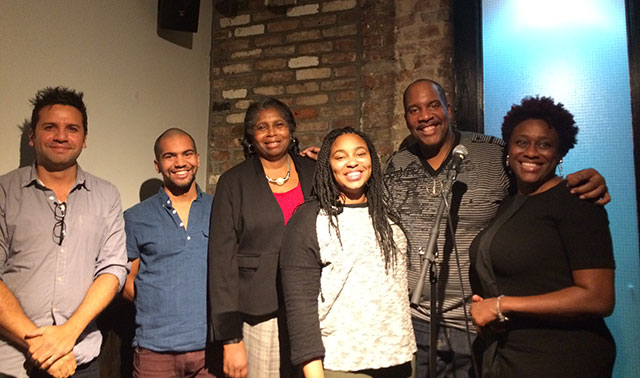
There’s been some good buzz around the reading series Soul Sister Revue, curated by the poet Cynthia Manick. I was eager to see how the series has taken shape since its early shows at Cornelia Street Café and the New York Poetry Festival.
I headed to Hi-Fi in the East Village on a recent Tuesday night. The back-room felt intimate in an old-school-Village kind of way, complete with red brick and a tiny stage.
A few minutes after six, just about every seat was filled. The room had the intensity of a class about to begin.

Ed Toney, a chemist by day and a poet by night, was our host for the evening. “What is soul?” asked Toney. Some audience members called out the names of beloved musicians.
“What’s soul?” Toney asked again.
“It’s what you be feeling,” said the poet Tyehimba Jess, sitting in the audience.
With that, the room warmed up, and Toney welcomed the first featured reader of the evening, E.J. Antonio. I’ve seen Antonio perform with a bassist, and her poetry is rich with jazz-infused music. She began with “Latch Key,” a poem with stark, crisp lines: “For safety, lock the doors.” The poem weaves between childhood and the adult speaker’s present predicament: “Admire how lonely has become a deep crease in your forehead.” Out of loss comes wisdom related to a daughter: “Be rain, wash it all away.”
Soul is serious business, and the evening moved briskly from poet to poet, no breaks. Up next was Jeremy Clark, who recently moved to Newark from his home state of Kentucky to attend the M.F.A program at Rutgers. Clark read poems of delicate hurt about that richest of topics, childhood: “Let the broken light bulb tell it.” The young speaker escapes into his imagination, plastering a Jimi Hendrix poster over a hole in the wall: “I push my chair against the wall and the broom becomes a microphone.”

I ought to mention how Soul Sister Revue is unique in that it provides a space for poets who write in the narrative tradition. This gives the green light to poems rooted in story, memory and lived experience. “The series is meant to honor the African tradition of stories passing on through generations,” said Manick in an interview with English Kills. It’s also a space for women. Yet aspiring Soul Sisters ought to know that the series has featured poets of myriad backgrounds and genders. Done right, poetic risk leaps into the sublime.
On this particular night, the stakes felt particularly high. The next reader, Nigerian-born poet Hafizah Geter, read a piece that put words to the mass kidnapping of Nigerian girls: “Some have died of malaria, snakebites—the rest of marriage.” Geter’s poems about a sister’s illness and a childhood spent in Nigeria brimmed with startling metaphors: “Today my sister is a door put on backwards.”
“That voice, Hafizah,” said Toney after the applause. “You’re tapping into that elder soul.”
Toney, who is a Brooklyn-based poet and Soul Sister alumnus, facilitated the evening seamlessly. His relaxed stage presence was unmatched, his empathy palpable.

The next poet, Lynne Procope, director of the louderARTS project, prefaced her reading with a confession: “I dropped my pile of poems on the way here,” she said. I liked the spontaneity of her announcement, which seemed perfect in light of her work exploring lost memories. Procope grew up in Trinidad and read a poem about a time in her childhood when a serial killer struck the island, ending the innocence of childhood: “It would take me 30 years to remember.” The poem explored public and private trauma, leaving everyone, including the poet, breathless: “everything in full flower leaned windward.”

L.A.-based poet Mundo Rivera was the final reader of the evening, making his New York debut after a four-year hiatus. Rivera’s work reached back to his El Barrio roots with a poem that railed against silence: “My tooth will break out of its rusted cage.” There was also an ode to the 6 train “that jags like a child’s handwriting.” Rivera’s voice was a quiet boom, with lines delivered to the innermost self: “I want to die digging for gold”; “I want outlive the flag.”
Toney called the poets back up to the stage for a group photo. The house lights flashed on and off. There were quick hugs of goodbye and comparisons drawn to abruptly ended rent parties of days past.
When I asked for her reflection on the latest Soul Sister Revue, Manick simply said, “I hope people will go home and write stories.”


For more about the Soul Sister Revue, check out the series on the New York City Reading Series Census page.